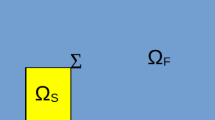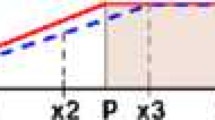Abstract
The main aim of this article is to present two new ways to solve the elliptic obstacle problem by using discontinuous Galerkin finite element methods. In Gaddam and Gudi (Comput Methods Appl Math 18:223–236, 2018. https://doi.org/10.1515/cmam-2017-0018), a bubble enriched conforming quadratic finite element method is introduced and analyzed for the obstacle problem in dimension 3. In this article, without adding bubble functions, we derive optimal order (with respect to regularity) a priori error estimates in dimension 2 and 3 using the localized behavior of DG methods. We consider two different discrete sets, one with integral constraints motivated from Gaddam and Gudi (2018) and the other with nodal constraints at quadrature points. We also discuss the reliability and efficiency of a proposed a posteriori error estimator. The analysis is carried out in a unified setting which holds for several DG methods. Numerical results are presented to illustrate the theoretical findings.






Similar content being viewed by others
References
Ainsworth, M., Oden, J.T.: A posteriori Error Estimation in Finite Element Analysis. Pure and Applied Mathematics (New York). Wiley-Interscience, New York (2000)
Ainsworth, A., oden, J.T., Lee, C.Y.: Local a posteriori error estimates for variational inequalities. Numer. Methods Partial Differ. Equ. 9, 23–33 (1993)
Arnold, D.N.: An interior penalty finite element method with discontinuous elements. SIAM J. Numer. Anal. 19, 742–760 (1982)
Arnold, D.N., Brezzi, F., Cockburn, B., Marini, L.D.: Unified analysis of discontinuous Galerkin methods for elliptic problems. SIAM J. Numer. Anal. 39, 1749–1779 (2002)
Atkinson, K., Han, W.: Theoretical Numerical Analysis. A Functional Analysis Framework, Thrid edn. Springer, Berlin (2009)
Banz, L., Stephan, E.P.: A posteriori error estimates of \(hp\)-adaptive IPDG-FEM for elliptic obstacle problems. Appl. Numer. Math. 76, 76–92 (2014)
Banz, L., Schröder, A.: Biorthogonal basis functions in hp-adaptive FEM for elliptic obstacle problems. Comput. Math. Appl. 70(8), 1721–1742 (2015)
Bartels, S., Carstensen, C.: Averaging techniques yield relaible a posteriori finite element error control for obstacle problems. Numer. Math. 99, 225–249 (2004)
Braess, D.: A posteriori error estimators for obstacle problems-another look. Numer. Math. 101, 415–421 (2005)
Brenner, S.C.: Two-level additive Schwarz preconditioners for nonconforming finite element methods. Math. Comput. 65, 897–921 (1996)
Brenner, S.C.: Convergence of nonconforming multigrid methods without full elliptic regularity. Math. Comput. 68, 25–53 (1999)
Brenner, S.C., Scott, L.R.: The Mathematical Theory of Finite Element Methods \((\)Third Edition\()\). Springer, New York (2008)
Brenner, S.C., Sung, L., Zhang, Y.: Finite element methods for the displacement obstacle problem of clamped plates. Math. Comput. 81, 1247–1262 (2012)
Brenner, S.C., Sung, L., Zhang, H., Zhang, Y.: A quadratic C0 interior penalty method for the displacement obstacle problem of clamped Kirchhoff plates. SIAM J. Numer. Anal. 50, 3329–3350 (2012)
Brezzi, F., Hager, W.W., Raviart, P.A.: Error estimates for the finite element solution of variational inequalities. Part I. Primal theory. Numer. Math. 28, 431–443 (1977)
Braess, D., Carstensen, C., Hoppe, R.H.W.: Convergence analysis of a conforming adaptive finite element method for an obstacle problem. Numer. Math. 107, 455–471 (2007)
Braess, D., Carstensen, C., Hoppe, R.: Error reduction in adaptive finite element approximations of elliptic obstacle problems. J. Comput. Math. 27, 148–169 (2009)
Chen, Z., Nochetto, R.: Residual type a posteriori error estimates for elliptic obstacle problems. Numer. Math. 84, 527–548 (2000)
Ciarlet, P.G.: The Finite Element Method for Elliptic Problems. North-Holland, Amsterdam (1978)
Pietro, D., Antonio, D., Ern, A.: Mathematical Aspects of Discontinuous Galerkin Methods. Mathématiques & Applications (Berlin), vol. 69. Springer, Heidelberg (2012)
Dörlfer, W.: A convergent adaptive algorithm for Poisson’s equation. SIAM J. Numer. Anal. 33, 1106–1124 (1996)
Douglas Jr., J., Dupont, T.: Interior Penalty Procedures for Elliptic and Parabolic Galerkin Methods. Lecture Notes in Physics, vol. 58. Springer, Berlin (1976)
Falk, R.S.: Error estimates for the approximation of a class of variational inequalities. Math. Comput. 28, 963–971 (1974)
Feischl, M., Page, M., Praetorius, D.: Convergence of adaptive FEM for some elliptic obstacle problem with inhomogeneous Dirichlet data. Int. J. Numer. Anal. Model. 11, 229–253 (2014)
Gaddam, S., Gudi, T.: Bubbles enriched quadratic finite element method for the 3D-elliptic obstacle problem. Comput. Methods Appl. Math. 18, 223–236 (2018). https://doi.org/10.1515/cmam-2017-0018
Glowinski, R.: Numerical Methods for Nonlinear Variational Problems. Springer, Berlin (2008)
Zou, Q., Veeser, A., Kornhuber, R., Gräser, C.: Hierarchical error estimates for the energy functional in obstacle problems. Numer. Math. 117, 653–677 (2011)
Gudi, T., Porwal, K.: A posteriori error control of discontinuous Galerkin methods for elliptic obstacle problems. Math. Comput. 83, 579–602 (2014)
Gudi, T., Porwal, K.: A remark on the a posteriori error analysis of discontinuous Galerkin methods for obstacle problem. Comput. Methods Appl. Math. 14, 71–87 (2014)
Gudi, T., Porwal, K.: A reliable residual based a posteriori error estimator for a quadratic finite element method for the elliptic obstacle problem. Comput. Methods Appl. Math. 15, 145–160 (2015)
Gustafsson, T., Stenberg, R., Videman, J.: Mixed and stabilized finite element methods for the obstacle problem. SIAM J. Numer. Anal. 55–6, 2718–2744 (2017). https://doi.org/10.1137/16M1065422
Gwinner, J.: On the \(p\)-version approximation in the boundary element method for a variational inequality of the second kind modelling unilateral contact and given friction. Appl. Numer. Math. 59, 2774–2784 (2009)
Gwinner, J.: \(hp\)-FEM convergence for unilateral contact problems with Tresca friction in plane linear elastostatics. J. Comput. Appl. Math. 254, 175–184 (2013)
Hesthaven, J.S., Warburton, T.: Nodal Discontinuous Galerkin Methods: Algorithms, Analysis, and Applications. Springer, New York (2007)
Hintermüller, M., Ito, K., Kunish, K.: The primal-dual active set strategy as a semismooth Newton method. SIAM J. Optim. 13, 865–888 (2003)
Hoppe, R.H.W., Kornhuber, R.: Adaptive multilevel methods for obstacle problems. SIAM J. Numer. Anal. 31, 301–323 (1994)
Kesavan, S.: Topics in Functional Analysis and Applications. New Age International Ltd, Publishers, New Delhi (1989)
Kinderlehrer, D., Stampacchia, G.: An Introduction to Variational Inequalities and Their Applications. SIAM, Philadelphia (2000)
Nochetto, R., Siebert, K., Veeser, A.: Fully localized a posteriori error estimators and barrier sets for contact problems. SIAM J. Numer. Anal. 42, 2118–2135 (2005)
Nochetto, R., Petersdorff, T.V., Zhang, C.S.: A posteriori error analysis for a class of integral equations and variational inequalities. Numer. Math. 116, 519–552 (2010)
Page, M., Praetorius, D.: Convergence of adaptive FEM for some elliptic obstacle problem. Appl. Anal. 92, 595–615 (2013)
Hammer, P.C., Marlowe, O.J., Stroud, A.H.: Numerical integration over simplexes. Math. Tables Other Aids Comput. 10(55), 137–139 (1956)
Rivière, B., Wheeler, M.F., Girault, V.: A priori error estimates for finite element methods based on discontinuous approximation spaces for elliptic problems. SIAM J. Numer. Anal. 39, 902–931 (2001)
Riviëre, B.: Discontinuous Galerkin Methods for Solving Elliptic and Parabolic Equations: Theory and Implementation. SIAM, Philadelphia (2008)
Siebert, K., Veeser, A.: A uniliterally constrained quadratic minimization with adaptive finite elements. SIAM. J. Optim. 18, 260–289 (2007)
Suttmeier, F.T.: Numerical Solution of Variational Inequalities by Adaptive Finite Elements. Vieweg+Teubner Research, Berlin (2008)
Veeser, A.: Efficient and relaible a posteriori error estimators for elliptic obstacle problems. SIAM J. Numer. Anal. 39, 146–167 (2001)
Wang, L.: On the quadratic finite element approximation to the obstacle problem. Numer. Math. 92, 771–778 (2002)
Wang, F., Han, W., Cheng, X.: Discontinuous Galerkin methods for solving elliptic variational inequalities. SIAM J. Numer. Anal. 48, 708–733 (2010)
Wang, F., Han, W., Eichholz, J., Cheng, X.: A posteriori error estimates for discontinuous Galerkin methods of obstacle problems. Nonlinear Anal. Real World Appl. 22, 664–679 (2015)
Wang, F., Han, W., Eichholz, J.: A two level algorithm for an obstacle problem. Appl. Math. Comput. 330, 65–76 (2018)
Weiss, A., Wohlmuth, B.I.: A posteriori error estimator for obstacle problems. SIAM J. Numer. Anal. 32, 2627–2658 (2010)
Wheeler, M.F.: An elliptic collocation-finite-element method with interior penalties. SIAM J. Numer. Anal. 15, 152–161 (1978)
Author information
Authors and Affiliations
Corresponding author
Additional information
Communicated by Ralf Hiptmair.
Publisher's Note
Springer Nature remains neutral with regard to jurisdictional claims in published maps and institutional affiliations.
The first author’s work is supported by University Grants Commission, India. The second author’s work is supported by the DST MATRICS Grant. The third author’s work is supported by DST Inspire Faculty Research Grant.
Rights and permissions
About this article
Cite this article
Gaddam, S., Gudi, T. & Porwal, K. Two new approaches for solving elliptic obstacle problems using discontinuous Galerkin methods. Bit Numer Math 62, 89–124 (2022). https://doi.org/10.1007/s10543-021-00869-w
Received:
Accepted:
Published:
Issue Date:
DOI: https://doi.org/10.1007/s10543-021-00869-w




